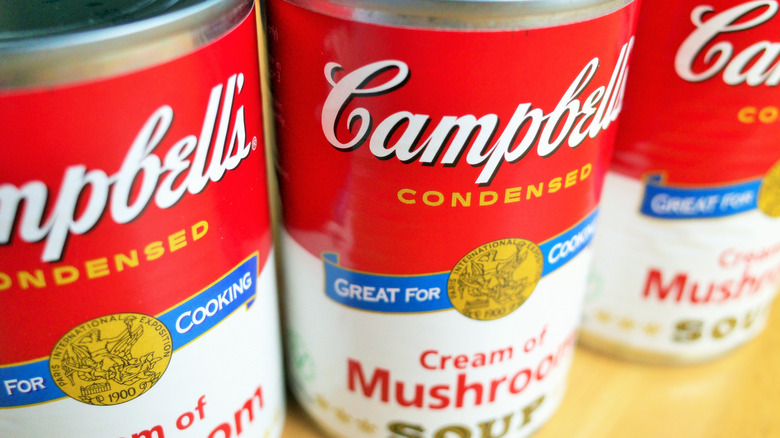The Ingredients To Watch Out For In Canned Soup
In the late 1800s, Dr. John T. Dorrance, a chemist who worked at the Campbell's Soup Company, invented condensed canned soup, making soup more affordable and portable (via Campbell's Soup Company). However, the inherent convenience of canned soup can come with downsides. For starters, the fact that canned soup is processed — and thus, with many additives — can have a negative impact on your health.
According to Healthline, a main additive found in many canned soups is monosodium glutamate (MSG). MSG, a flavor enhancer, has been controversial for decades due to study results that revealed its harmful neurological effects on mice. While MSG is considered safe for humans, some who consume it may experience headaches and numbness after eating a substantial amount. Guar gum, which is added to canned soups as a thickener, is another common additive that can produce adverse health effects if consumed in high amounts. This is because it is known to swell and lead to potential obstruction in the esophagus and small intestine. Guar gum is believed to have some healthy properties in small amounts, and the FDA regulates the amount of guar gum that can be added to foods to reduce the chances of side effects. Xanthan gum is another additive often found in canned soups. Some experts suggest that xanthan gum has potential health benefits such as lowering blood sugar levels, but consuming it in large quantities could lead to digestive issues.
Other ingredients in canned soup to keep an eye on
Besides the additives in canned soup, you'll also want to keep an eye on sodium and sugar. For instance, if you consume a can of soup in one sitting, you may end up ingesting over 2,300 milligrams of sodium and 20 grams of sugar. Samantha Cassetty, MS, RD, a nutrition and wellness expert, suggests that you only consider canned soups with four grams or less of sugar (via Today).
As far as sodium goes, staying below 2,300 milligrams per day is the goal, according to registered dietitian Tracy Lockwood Beckerman (via Well+Good). "If you suffer from heart disease or diabetes, you want that goal to even lower: 1,500 milligrams." Beckerman suggests looking for soups containing roughly 400 milligrams of sodium. "That's less than 20 percent of the total amount of sodium intake a day," she adds.
If you reach into your cupboard each week for canned soup, you're hardly alone. According to Statista, over 36 million Americans consumed eight cans or more of canned or packaged soup within a week in 2020. Fortunately, there are plenty of canned soups available that are designed to be healthier options. A couple of Beckerman's favorite canned soups include Health Valley's No Salt Added Vegetable Soup for its low sodium and high density of vegetables. For carnivores, she gives a big thumbs up to True Primal Grass-Fed Beef and Vegetable Soup for its high-protein, 100% grass-fed beef, natural spices, and antioxidant-rich vegetables.


